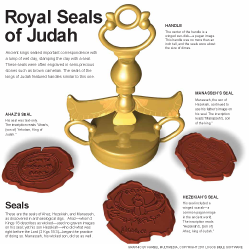21:1–18 According to the author of 1–2 Kings, Manasseh is the epitome of evil. Not only does he undo the reforms of his father, Hezekiah, but he also violates more religious precepts than any king before him—even more than the Canaanites and Amorites (vv. 9, 11). Many of Manasseh’s sins mirror those that caused the downfall of the northern kingdom of Israel (17:7–18), so it is no surprise that he is blamed for the fall of Judah. See note on Jer 15:4. |
21:1 Manasseh The longest-reigning king in either Judah or Israel (55 years: 697–642 bc). He also is described as one of the most wicked kings to rule either nation. See note on 2 Chr 33:1.
21:2 He did evil The author lays similar accusations upon King Ahaz of Judah (2 Kings 16:3) and the kingdom of Israel generally (17:8).
the detestable things of the nations Described in Deut 18:9–14.
21:3 He returned and rebuilt the high places Manasseh undoes Hezekiah’s reforms (2 Kgs 18:4–7).
a pole of Asherah worship A sacred pole associated with the cult of the Canaanite goddess Asherah.
Ahab king of Israel The author of 1–2 Kings considers Ahab the most sinful king of the northern kingdom of Israel, primarily because he instituted worship of the god Baal and the goddess Asherah (1 Kgs 16:30–33). See 2 Kings 8:18 and note.
all of the host of heaven The sun, moon, stars, and planets (23:5). The book of 2 Kings first mentions this kind of idolatry, called astral worship, in the list of Israel’s sins (17:16). Biblical law expressly forbids such worship (Deut 4:19).
21:6 He made his son pass through the fire See 2 Kings 16:3 and note.
mediums and spiritists Forbidden in Lev 20:6 and Deut 18:9–14. People who interacted with the spirit world were expelled from the land by Saul (1 Sam 28:3, 9).
21:7 the image of the Asherah This act violates a number of prohibitions, most prominently the worship of other gods and the use of divine images (Exod 20:3–6; Deut 5:3, 8–10).
I will put my name The author reiterates God’s covenant with David and Solomon (see 2 Sam 7:13 and note) to show that Manasseh’s actions had violated it. By placing an idol in the temple, Manasseh defiled the place where God had chosen to put His name.
21:8 they only observe to do Yahweh’s promise is contingent on obedience to the law (see Deut 28; 1 Kgs 9:3–9).
21:9 that Yahweh destroyed Refers to the prior inhabitants of the promised land (e.g., Canaanites, Amorites) who were driven out because of their idolatry (which Israel and Judah later adopted; Deut 18:9–14; 2 Kgs 17:8; 21:2).
21:11 the Amorites Driven out by Yahweh for the people of Israel. Compare v. 2 which only mentions the nations in general.
21:12–15 The judgment and exile of Judah are described here as a direct result of Manasseh’s sins, which violated God’s covenant (see note on v. 7). They also mirrored the sins of the northern kingdom that led to its defeat and exile (see 17:7–23 and note). |
21:12 who hear it will tingle This same phrase appears in Yahweh’s message to the young prophet Samuel regarding the destruction of the house of Eli (1 Sam 3:11) and in a prophecy of Jeremiah against Judah and Jerusalem (Jer 19:3).
21:13 the plumb line of the house of Ahab Yahweh will apply the same standard of judgment to Jerusalem and Manasseh that he applied to Samaria (Israel’s capital city) and Ahab, king of Israel.
turns it on its face To ensure that any leftover scraps are removed. This imagery suggests that the purity of Jerusalem is more important than the lives of its inhabitants.
21:14 the remainder of my inheritance Refers to the last of God’s people remaining in the promised land and particularly the tribe of Judah (2 Kgs 17:18). The use of the Hebrew word nachalah, meaning “inheritance” or “heritage,” highlights God’s special relationship with His people (see Deut 9:26, 29; 32:9; 1 Kgs 8:51, 53).
or “heritage,” highlights God’s special relationship with His people (see Deut 9:26, 29; 32:9; 1 Kgs 8:51, 53).
21:16 innocent blood In prophetic addresses, shedding innocent blood refers to oppressing the poor (Jer 7:6; 22:3; Ezek 22:7).
21:17 the events of the days of the kings of See note on 2 Kgs 1:18.
21:18 slept with his ancestors See note on 8:24.
in the garden of Uzza Manasseh is the first king to be buried here; previous kings of Judah (ending with Hezekiah) were buried in the city of David. This garden might have belonged to King Uzziah the leper (also called Azariah; ch. 15) or perhaps to the Uzzah who was killed for touching the ark of the covenant (2 Sam 6:3–8).
21:19–26 The reign of Amon (ca. 642–640 bc) is overshadowed by the sins of his father, Manasseh (2 Kings 21:1–18), and the reforms of his son, Josiah (chs. 22–23). Amon’s evil suggests that Manasseh’s sins took hold in Judah. |
21:24 the people of the land The Hebrew phrase used here, am ha’arets, may describe a distinct upper-class social group—a sort of aristocracy—that is active during crises involving David’s royal line (compare 11:12–20).
may describe a distinct upper-class social group—a sort of aristocracy—that is active during crises involving David’s royal line (compare 11:12–20).
21:25 the events of the days of the kings of Judah See note on 1:18.

|
About Faithlife Study BibleFaithlife Study Bible (FSB) is your guide to the ancient world of the Old and New Testaments, with study notes and articles that draw from a wide range of academic research. FSB helps you learn how to think about interpretation methods and issues so that you can gain a deeper understanding of the text. |
| Copyright |
Copyright 2012 Logos Bible Software. |
| Support Info | fsb |
 Loading…
Loading…


